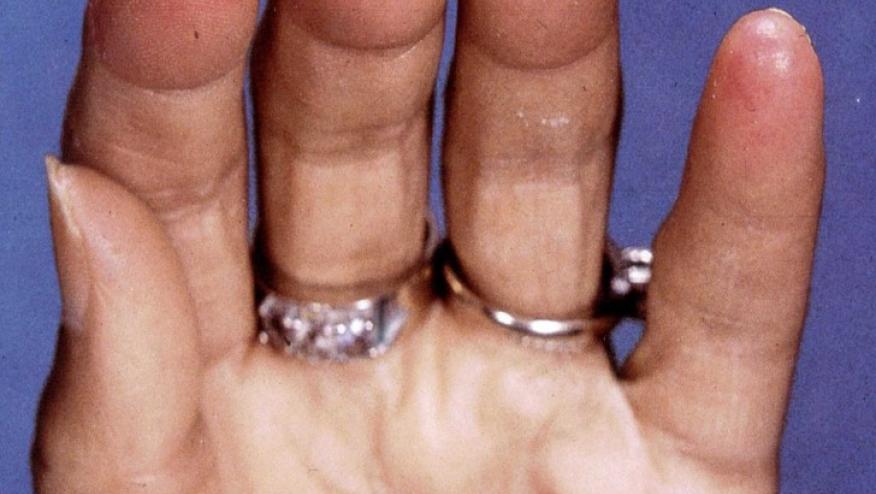Tocilizumab Benefits Persist in SSc Save

Clinically meaningful improvements in systemic sclerosis among patients treated with subcutaneous tocilizumab (Actemra) persisted during the open-label phase of a multinational randomized phase II trial, researchers reported.
At week 48, the conclusion of the double-blind phase of a study known as faSScinate, change from baseline on the modified Rodnan skin score was -5.6 (95% CI -8.9 to -2.4) among patients who were receiving tocilizumab, according to Dinesh Khanna, MD, of the University of Michigan in Ann Arbor, and colleagues.
By week 96, additional decreases were seen on skin scores, bringing the total improvement to a score of -9.1 (95% CI -12.5 to -5.6).
Meanwhile, patients who had been randomized to placebo for the first 48 weeks had a change from baseline in Rodnan skin scores of -3.1 (95% CI -5.4 to -0.9), but by week 96, after 48 weeks of open-label tocilizumab, mean change in score was -9.4 (95% CI -11.8 to -7), the investigators reported online in Annals of the Rheumatic Diseases.
The differences at week 48, while clinically meaningful, were not statistically significant, they noted.
Morbidity and mortality are high among patients with systemic sclerosis, particularly among those with lung involvement, and few treatment options are available. Cyclophosphamide has been used for pulmonary disease, but is associated with significant toxicity, and stem cell transplantation has improved skin fibrosis and lung function but is associated with risks and high costs.
The rationale for using tocilizumab, a monoclonal antibody targeting the interleukin (IL)-6 receptor-α, is that IL-6 is thought to be involved in the pathogenesis of SSc, with patients having increased IL-6 expression in endothelial cells and elevations of IL-6 in serum.
The faSScinate study was conducted in 35 centers in North America and Europe, enrolling 87 patients with active disease of less than 5 years' duration. The majority were white women, and baseline total modified Rodnan skin score was about 25. The treatment consisted of subcutaneous injections of tocilizumab, 162 mg, once weekly.
At week 48, 30 (69.8%) of the patients originally randomized to tocilizumab entered the open-label phase, as did 31 (70.5%) of those who received placebo in the blinded phase. The full 96-week study was completed by 27 (62.8%) of those who had been on active treatment throughout and by 24 (54.5%) of those originally given placebo.
By week 96, a total of 27 patients who had been on continuous tocilizumab (during the placebo-controlled phase and the open-label phase) had achieved the minimal clinically important difference on the skin score of a change of at least 4.7 units, as had 24 of those in the placebo-tocilizumab group.
For lung function, similar proportions of patients in the continuous tocilizumab and placebo-tocilizumab experienced absolute decreases in percent predicted forced vital capacity in the open-label phase (46% and 42%, respectively), whereas during the double-blind phase, 54% of the tocilizumab group experienced any worsening compared with 83% of those in the placebo group.
Improvements also were seen on patient-reported outcomes by week 96 for both continuous tocilizumab and placebo-tocilizumab groups. For instance, on the Health Assessment Questionnaire Disability Index, changes from baseline were -0.13 and -0.29, respectively.
The most common adverse events in this study were infections, as has been seen in clinical trials of tocilizumab in rheumatoid arthritis. However, "rates of serious adverse events and serious infections in this study in patients with SSc were approximately five times and eight times higher, respectively, than those reported in patients with rheumatoid arthritis, which is expected given the high morbidity and mortality in patients with SSc," the authors wrote.
In particular, patients with SSc are prone to develop digital ulcers, and two patients had infected digital ulcers and one had osteomyelitis.
The investigators emphasized that the study was not powered for a statistical comparison of efficacy during the open-label phase, noting that a phase III randomized controlled trial (NCT02453256) including more than 200 patients is underway.
They concluded that tocilizumab was beneficial for skin and lung manifestations of SSc, and "may be a promising targeted therapy for patients with progressive SSc who have few treatment options."
Limitations of the study were its open-label design after week 48 and a high discontinuation rate. In addition, patients who completed the 48-week blinded phase and entered the open-label phase may have been healthier, so selection bias was possible.
The study was funded by Roche.










If you are a health practitioner, you may Login/Register to comment.
Due to the nature of these comment forums, only health practitioners are allowed to comment at this time.